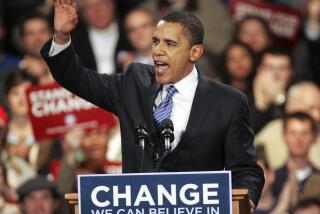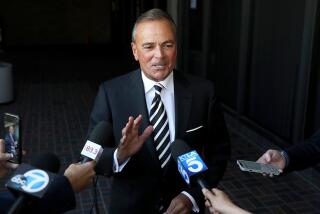Campaign ’96 : FINANCES : As Campaign Pinches Pennies, Buchanan Gains Valuable Ground
- Share via
MANCHESTER, N.H. — You may know him best as a street fighter, the pugilist of the political landscape. But strip away all that navy worsted and what you really have is Patrick J. Buchanan--conservative presidential candidate and campaign coupon-clipper, the king of political two-for-one.
There he is in the middle of Manchester in the ballroom of the Holiday Inn, rehearsing two new ads, one for radio and one for television. The scenario screams “low budget,” for this morning he is Pat-of-all-trades--actor, writer, editor, director, checking his watch, timing his words.
But more is happening this morning than cheap-in-action; the subplot here is efficiency and savvy. It is the day of this week’s nationally televised debate among the GOP contenders, which usually means empty hours on the campaign trail with the candidates hidden away, polishing their positions.
Nothing happens on a day like this. But there is television time to fill--Buchanan called this a press conference and some 300 journalists showed up to watch.
“That’s us, no money,” said Peter R. Robbio, executive director of Buchanan’s campaign in the Granite State. And Robbio was smiling as he said this, because so far it has not seemed to have mattered.
In the Iowa caucuses, Buchanan came in a strong second--hard on the heels of flush front-runner Bob Dole--even though he spent a third less money in the Hawkeye State than the Senate majority leader. Each of Buchanan’s votes cost him $26.65; Dole spent about $35 per vote and publishing magnate Steve Forbes came in a distant fourth while paying $407.50 for each vote.
The Iowa figures mirror the overall financial picture. Buchanan has emerged as Dole’s closest rival for less than half the cost--during 1995, the political commentator spent $7.1 million on his campaign, while the Kansas senator’s expenses totaled more than $16 million, according to Federal Election Commission reports.
*
How does Buchanan make his dollars stretch so? For one thing, the rent on his Des Moines campaign headquarters was dirt cheap, said Loras A. Schulte, the candidate’s Iowa campaign director. Schulte would not divulge the figure, but it probably helped that the building is set to be condemned to make way for a highway.
The cost-saving approach extends through the campaign’s ranks. As the Iowa caucuses neared, 20 volunteers from neighboring Illinois drove across the Mississippi River to set up a phone bank so they could save on long-distance charges. Sitting in a cramped Fort Dodge, Iowa, hotel room, they logged 900 calls a day.
Here, as Tuesday’s primary looms, dozens of Buchanan volunteers are crammed into the tight front office of his dingy downtown headquarters. The carpet is gray, soggy and stained. On this day they have run out of coffee; Robbio could not find an empty chair.
Sure, Robbio’s running a sort of guerrilla campaign; he didn’t rent a copy machine until the end of January, the same month Buchanan began airing television ads, the last candidate to do so here. “Still, while we’ve had to be careful in how we spend our money, I really have not wanted for anything in New Hampshire,” Robbio said. “We run a tight ship.”
*
Maria Goodman, volunteer and true believer, came 50 miles to work in this office for her man Pat. “We’re all volunteers,” she said, looking around proudly. “The food in the office is donated. Pat Buchanan is not beholden to anyone. . . . Have some, honey, kielbasa to die for. I’ll get you a paper plate.”
The contrast on Elm Street couldn’t be clearer. Buchanan’s office is at No. 816, up a flight of grimy stairs from the Merrimack Family Restaurant--today’s special, macaroni and cheese, $4.95.
Across the street and up a block, posh at No. 999, is the shuttered headquarters of Texas Sen. Phil Gramm, who began his presidential quest as an especially well-financed candidate but ended it after a dismal showing in Iowa. The Gramm office is in a glass-front brick building, next door to a branch of the Charles Schwab brokerage firm.
Times staff writer Sam Fulwood III contributed to this story.
More to Read
Get the L.A. Times Politics newsletter
Deeply reported insights into legislation, politics and policy from Sacramento, Washington and beyond. In your inbox twice per week.
You may occasionally receive promotional content from the Los Angeles Times.









